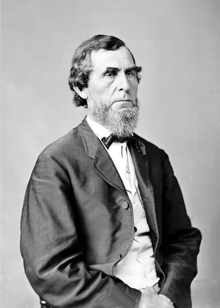Columbus Delano
| Columbus Delano | |
|---|---|
 |
|
| 11th United States Secretary of the Interior | |
|
In office November 1, 1870 – September 30, 1875 |
|
| President | Ulysses S. Grant |
| Preceded by | Jacob Dolson Cox |
| Succeeded by | Zachariah Chandler |
| Member of the U.S. House of Representatives from Ohio's 13th district |
|
|
In office March 4, 1865 – March 3, 1867 |
|
| Preceded by | John O'Neill |
| Succeeded by | George W. Morgan |
|
In office June 3, 1868 – March 3, 1869 |
|
| Preceded by | George W. Morgan |
| Succeeded by | George W. Morgan |
| Member of the U.S. House of Representatives from Ohio's 10th district |
|
|
In office March 4, 1845 – March 3, 1847 |
|
| Preceded by | Alfred P. Stone |
| Succeeded by | Daniel Duncan |
| Personal details | |
| Born |
June 4, 1809 Shoreham, Vermont, US |
| Died | October 23, 1896 (aged 87) Mount Vernon, Ohio, US |
| Political party |
National Republican Whig Republican |
| Spouse(s) | Elizabeth Leavenworth (m. 1834) |
| Profession | Politician, Lawyer, Farmer, Banker |
| Signature | |
Columbus Delano, (June 4, 1809 – October 23, 1896) was a lawyer, rancher, banker, statesman and a member of the prominent Delano family. Delano was elected U.S. Congressman from Ohio, serving two full terms and one partial one. Prior to the American Civil War, Delano was a National Republican and then a Whig; as a Whig he was identified with the faction of the party that opposed the spread of slavery into the Western territories, and he became a Republican when the party was founded as the major anti-slavery party after the demise of the Whigs in the 1850s. During Reconstruction Delano advocated federal protection of African-Americans civil rights, and argued that the former Confederate states should be administered by the federal government, but were not part of the United States until they met the requirements for readmission to the Union. Delano served as President Ulysses S. Grant's Secretary of the Interior during a time of rapid Westward expansionism, and contended with conflicts between Native American tribes and American settlers. He was instrumental in the establishment of America's first national park, supervising the first U.S. federally funded exploratory scientific expedition into Yellowstone in 1871, and becoming America's first national park overseer in 1872. In 1874, Delano requested that Congress protect Yellowstone through creation of a federally funded administrative agency, the first Secretary of the Interior to request such preservation of a nationally important site.
Believing that tribal communalism and a nomadic lifestyle led to Indian wars and impoverishment, Delano argued the best Indian policy was to allot Native American tribes small reservations in the Indian Territory. In Delano's view the reservation system humanely protected Native Americans from the encroachment of western settlers, and would aid in Indian assimilation into white culture and independence from federal funding. To compel the Native Americans of the west to move to reservations, Delano supported the slaughter to near extinction of the vast buffalo herds, which were essential to the maintenance of the Plains Indians' lifestyle. In the area of government reform, Delano opposed Grant's 1872 executive order to implement the recommendations of the first Civil Service Commission. Profiteering and corruption permeated the Interior Department during his tenure, and Grant requested Delano's resignation in 1875; he left office with damage to his reputation for personal honesty. Delano returned to Ohio to practice law, tend to his business interests, and raise livestock; he did not return to politics, and died in 1896. Historians are critical of Delano's tenure at the Interior Department, arguing that he could have done more to stop corruption, protect bison, and prevent the destruction of the culture of the Plains Indians.
...
Wikipedia
